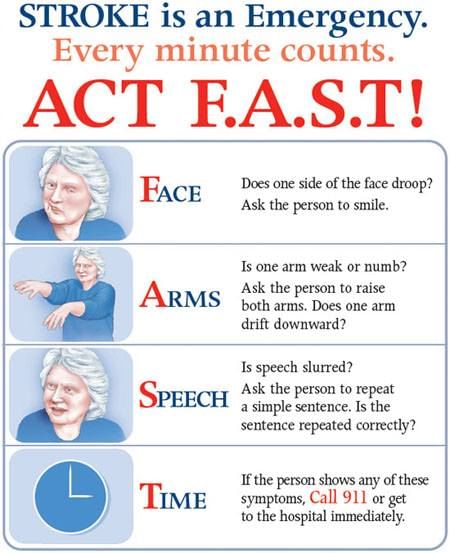Stroke: Awareness is Prevention
What is a stroke?
Stroke happens when the blood supply to part of the brain is cut off. Without blood, brain cells can be damaged or die. This damage can have different effects depending on where it happens in the brain. It can affect people’s body, mobility and speech, as well as how they think and feel.
Learn How To Prevent A Stroke
Here are six steps anyone can take to reduce the risk and the danger of stroke:
1. Know your personal risk factors: high blood pressure, diabetes, and high blood cholesterol.
2. Be physically active and exercise regularly.
3. Maintain a healthy diet high in fruit and vegetable and low in salt to stay a healthy state and keep blood pressure low.
4. Limit alcohol consumption.
5. Avoid cigarette smoke. If you smoke, seek help to stop now.
6. Learn to recognize the warning signs of a stroke.
Stroke is treatable.
Stroke is a complex medical issue. But there are ways to significantly reduce its impact. Recognizing the signs of stroke early, treating it as a medical emergency with admission to a specialized stroke unit, and access to the best professional care can substantially improve outcomes.
Access
The right care makes a difference, but many people are not getting the stroke treatment they need.
6 key facts about stroke treatment
1. Early recognition makes a big difference.
Knowing the signs of stroke and getting treatment quickly saves lives and improves recovery. If you think someone may have had a stroke, do this FAST check:
Face – Is one side drooping?
Arms – Raise both arms. Is one side weak?
Speech – Is the person able to speak? Are words jumbled or slurred?
Time – Act quickly and seek emergency medical attention immediately.
Stroke Warning Signs
a) Sudden numbness or weakness of the face, arm or leg, especially on one side of the body
b) Sudden confusion, trouble speaking or understanding
c) Sudden trouble seeing in one or both eyes
d) Sudden trouble walking, dizziness, loss of balance or coordination
e) Sudden, severe headache with no known cause
If you notice one or more of these signs, don't wait. Stroke is a medical emergency.
2. Around 1 in 10 more people make an excellent recovery when cared for in a specialized stroke unit. If we consider an isolated blood vessel, blood flow to the brain tissue can be hampered in two ways:
a) the vessel clogs within (ischemic stroke)
b) the vessel ruptures, causing blood to leak into the brain (hemorrhagic stroke)
All patients with stroke (ischaemic or haemorrhagic) should be admitted to a specialized stroke unit, which involves a designated ward with a specialized team.
3. Clot-busting drugs (tPA or thrombolysis) increase the chance of a good outcome by 30%.³
Clot-busting drugs break up blood clots. This treatment can be administered up to 4.5 hours of symptom onset in many patients with ischaemic stroke. The earlier it is given, the greater the effect.
4. Clot retrieval treatment increases the chance of a good outcome by more than 50%.4
Clot retrieval treatment (mechanical thrombectomy) involves removing a blood clot and can improve survival rates and reduce disability for many people with ischaemic stroke caused by large artery blockage.
5. Rehabilitation is a critical step in the treatment process.
Rehabilitation starts in the hospital as soon as possible following a stroke. It can improve function and help the survivor regain as much independence as possible over time.
6. One in four survivors will have another stroke.
Treatments that prevent another stroke include drugs to lower blood pressure and cholesterol, antiplatelet therapies, anticoagulation for atrial fibrillation, surgery or stenting for selected patients with severe carotid artery narrowing.
Lifestyle changes can also greatly reduce the risk of another stroke. Changes include eating well, being physically active, being tobacco-free, managing stress, and limiting alcohol consumption.
Join the fight against stroke.
Stroke affects us all. Let’s take action, drive awareness, and push for better access to stroke treatments.



+1.svg)
